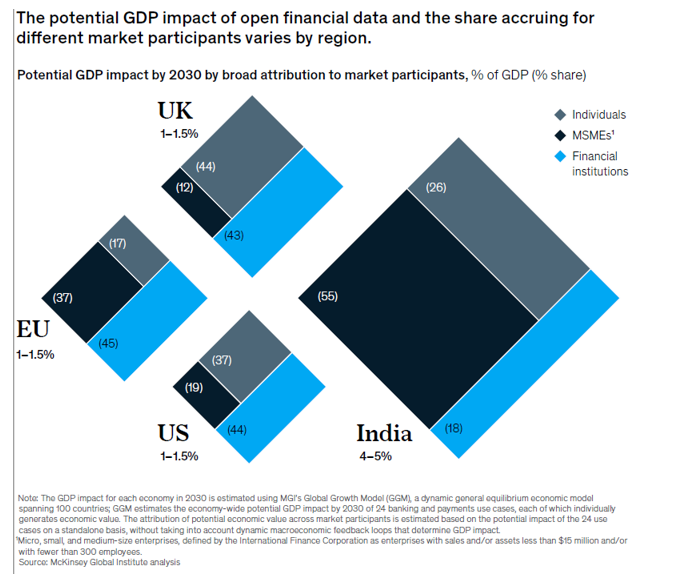From Australia and Brazil to Nigeria and the United States, countries are putting in place new guidelines and regulations governing the digital sharing of financial data.
The aim is to spur the creation of digital-data ecosystems that smooth and speed interactions between financial institutions and their individual and corporate customers. But successful adoption of open financial data could also provide a broader boost to global GDP.
By enabling customer data to flow frictionlessly between financial institutions through application programming interfaces (APIs), open-data systems reduce or remove the need for manual data processing.
Strong consumer trust is the essential prerequisite for such a system. That can be secured only by establishing a protective cushion of user consent, data protection, and cybersecurity.
With safeguards in place, the benefits can be significant. Individuals and small businesses can gain increased access to financial services; for example, data showing that a customer with a thin credit file reliably pays utility, rent, and other bills can improve their chances of receiving a loan, sometimes for the first time.
Other advantages for consumers include greater convenience – no need to continue filling out all those forms in triplicate – and a wider range of product options.
For many emerging economies, basic internet access, extensive smartphone penetration, and reliable power supplies also are prerequisites for capturing the full economic value of a data-sharing ecosystem.
In the United Kingdom, where so-called open banking has been in operation since 2018, customers can easily switch accounts from one institution to another to earn a higher deposit rate, and can compare mortgage rates from different providers without needing to go through fee-charging brokers.
In the US, President Biden’s July 9, 2021, executive order on promoting competition in the economy specifically referred to increased sharing of financial data, so that “consumers can more easily switch financial institutions and use new, innovative financial products.”
Financial-services providers benefit, too. Adopting open data improves their operational efficiency by providing them with verified data digitally, freeing them from the onerous tasks of manual entry or searching for information in data silos.
This significantly reduces the costs associated with remediating bad customer-relationship-management data, currently estimated at 20% of a typical financial institution’s income, and enables service providers to do more to automate their data operations.
Deeper data sharing also means that banks can allocate their staff resources to the most at-risk customers, and cut back on the need for data intermediation.
In the US, for example, nearly half of all mortgage providers rely on third-party data for loan origination, but open financial data are making much of this information publicly available.
Lastly, data sharing is an effective tool against fraud, as it provides more evidence and clues with which to flag suspicious activity, helping institutions strengthen their predictive fraud modeling.
Then come the macroeconomic gains. In a recent analysis of 24 financial data-sharing initiatives in banking and payments, we found that broad adoption of open-data systems can deliver a sizable economic boost. This could range from about 1-1.5% of GDP in 2030 in the European Union, the UK, and the US to as much as 4-5% in India (see chart).
Moreover, all market participants – financial institutions; individual customers; and micro, small, and medium-sized enterprises (MSMEs) – will benefit, albeit to varying degrees depending on each country’s financial depth and structure and the characteristics of its open-data system.

For now, even countries in the forefront of open-data adoption are capturing only a fraction of its potential value. We estimate that the UK is currently accessing 30-40% of the possible gains, and the US and Europe just 10%.
Realizing the full value requires a level of data standardization and breadth of data sharing that few economies currently have.
Standardization refers to the extent to which standardized mechanisms exist for sharing data and the associated cost of access, while breadth refers to the number of different types of financial data shared.
In some cases, data sharing is relatively ad hoc. In many countries, for example, consumers wanting automated access to competitive mortgages need to provide the same specific mortgage application data to multiple providers.
But operating at scale – and thereby capturing the most potential value – requires a wide range of financial data to be sourced easily through standard APIs at minimal cost.
Different players, from traditional banking incumbents to technology platforms and new fintech startups, could all play meaningful roles based on their areas of strength and competitive advantage.
Two other aspects are essential: robust digital financial infrastructure on which to build a data-sharing system, and innovation to ensure that it continues to flourish.
During the COVID-19 pandemic, countries with well-developed digital financial infrastructure have been able to disburse payments to businesses and individuals quickly and efficiently.
Such efforts rely heavily on digital payment channels, along with high-assurance digital-identification systems that have broad population coverage and built-in consumer protection.
For many emerging economies, basic internet access, extensive smartphone penetration, and reliable power supplies also are prerequisites for capturing the full economic value of a data-sharing ecosystem.
Innovation is the final frontier. The more value from open financial data that becomes accessible, the more the potential for innovation will grow, and probably in ways we cannot envisage today.
Different players, from traditional banking incumbents to technology platforms and new fintech startups, could all play meaningful roles based on their areas of strength and competitive advantage.
Establishing and expanding open financial-data ecosystems presents complex technical and regulatory challenges. But secure and trusted schemes also offer a large potential upside for consumers, financial institutions, and the economy.
(Olivia White is a partner in McKinsey & Company’s San Francisco office, and Anu Madgavkar is a New Jersey-based partner at the McKinsey Global Institute)
Copyright: Project Syndicate









Comment